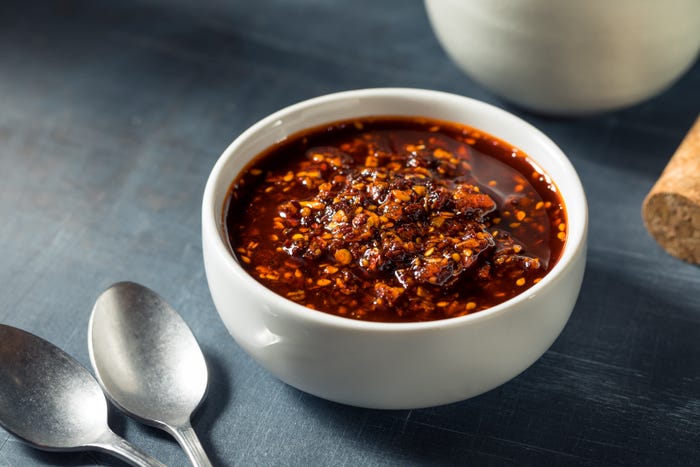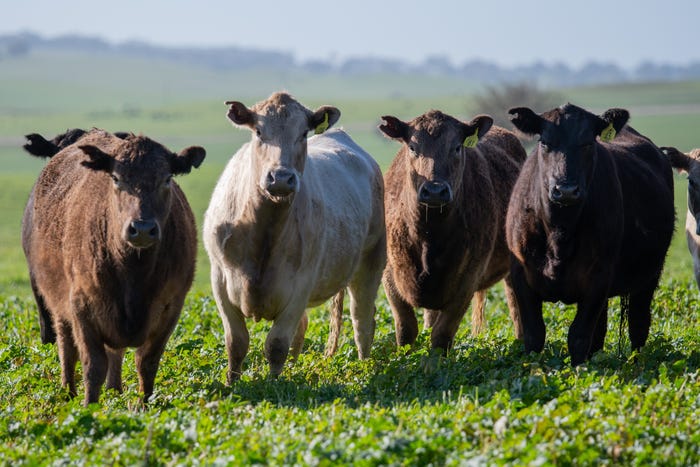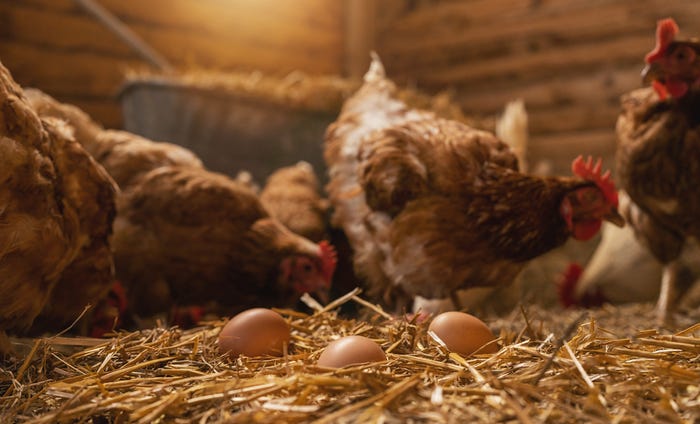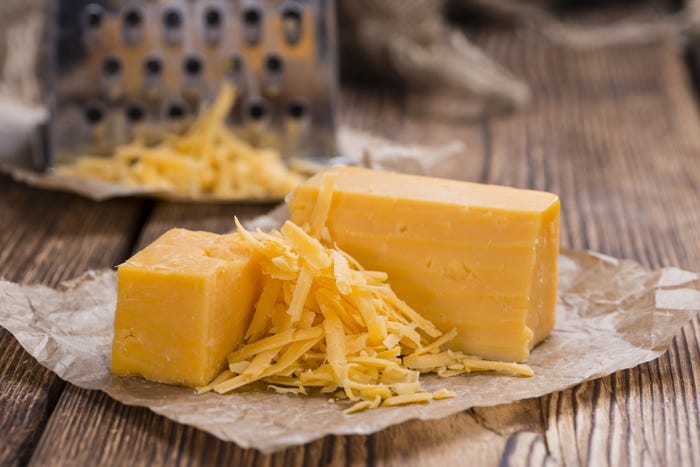Business Bites: It’s alive?! Australian company goes sci-fi, invents new ‘animal’
The dish on what’s new: Australian company Vow disrupts industry, creates new species of quail using cell cultivation tech; Momofuku sends cease-and-desist letters to small businesses; AFN seeks partners to reclassify grass-fed beef; and more.

At a Glance
- The new “animal,” dubbed Qualia, is crafted from a subspecies of Japanese quail, and is not, in fact, a new Pokémon.
- Asian-American cuisine giant Momofuku is facing backlash for trying to trademark “chili crunch.”
- AFN wants “the regenerative movement to become a viable certification program in the United States.”
It’s understandable if you have trust issues after last week’s April Fools’ joke about the ban on chicken nuggets, but we pinky promise this one is true: A company Down Under recently created a new kind of meat using cell cultivation technology (Spoiler: It’s a bird. Well, a lump of bird cells mixed with other ingredients, but it reportedly tastes great.). Also, the American Farmers Network (AFN) is looking to redefine grass-fed beef and celebrity chef David Chang faces backlash for going after small businesses. All that and more in this week’s Business Bites.
.jpg?width=700&auto=webp&quality=80&disable=upscale)
Photo courtesy of Vow
Vow reveals new “animal” inspired by Japanese quail
The cultured meat company that brought us the world’s first woolly mammoth meatball is back at it again, continuing to push boundaries in the industry. Australian-based company Vow recently unveiled a new creature (yes, you read that right), known as Quailia, a subspecies of the Japanese quail. It is being utilized exclusively in the company’s new Forged Parfait, a pate product available only from Vow’s Forged brand, and currently only in Singapore.
To create the innovative product, Forged’s food scientists identified and isolated a small sample of cells from a Japanese quail responsible for its taste and texture. After studying the cells to discover what nutrients and environment in which they thrive, they moved them to a bioreactor — a small stainless steel vessel similar to the ones used to brew beer — to emulate the natural growth conditions needed to flourish. The company’s chefs then mixed those cells with proprietary ingredients to create the new creature, scientifically known as Coturnix Fornax. Unlike its animal counterpart, Quailia lacks a heart, brain, feathers and bones, since its entire “body” consists “only of rich flavors, delicate textures and delectable meat made to be eaten,” according to Vow’s Co-founder and CEO George Peppou.
“Our ambition was to bring a flavor and texture combination together you couldn’t get anywhere else — a delightful contradiction that is both rich and delicate at once,” he said. “Over the last four years, we’ve explored hundreds of different species, and found that with cultured Japanese quail, we were able to craft this rare pairing — a rich umami flavor with a weightless, melt-in-your-mouth quality.”

Momofuku founder attempts to trademark “chili crunch,” threatens CPGs producing similar products
A quick Google search of “chili crunch” uncovers dozens of products bearing the popular description, from well-known manufacturers and brands like Trader Joe’s and Spice World. Originating in China and known under other names such as “chili oil” and “chili sauce,” the deep red condiment consists of oil infused with peppers/dried chiles, spices and other crunchy ingredients like onions and garlic. Momofuku, a culinary brand established by world-renowned Michelin star chef David Chang, however, is claiming sole ownership over the famed condiment name. The megabrand recently sent a slew of cease-and-desist letters to a handful of CPGs using the terms “chili crunch” and “chile crunch” on their labels, stating that they can be mistaken for Momofuku Chili Crunch, even though their designs are vastly different than the transparent, minimalistic Momofuku product. Though Momofuku owns the trademark rights to “chile crunch,” which was only obtained with the United States Patent and Trademark Office (USPTO) in 2023 through a legal battle with the original owner Chile Colonial LLC, it doesn’t own the rights to “chili crunch.” On March 29, Momofuku filed a request with USPTO to trademark “chili crunch,” as first reported by The Guardian, in an attempt to prohibit other brands (which are much smaller and don’t have the funds to fight a multi-million-dollar corporation like Momofuku) from using the popular name. The approval process, however, could take up to a year, and would require Momofuku to prove that the name “chili crunch” is “not merely a description of the product inside the jar,” but that it “has distinctiveness through extensive use in commerce over many years,” as described on the USPTO website.
One of the companies that received a cease-and-desist letter from Momofuku on March 18, Homiah, is a Malaysian food brand founded by Michelle Tew, which was accused of trademark infringement for its Homiah Sambal Chili Crunch. Tew’s chili crunch is derived from a family recipe and packaged in a colorful, intricately designed bottle that is distinctly different from Momofuku Chili Crunch. Tew explained to Food & Beverage Insider that the letter gives her company 90 days to remove “chili crunch” from its labels, website and marketing efforts, and asks her to agree to never register or apply for any sort of trademark that includes the words “chili” or “chili crunch” — or face hefty legal implications. She also said Momofuku didn’t make it clear in the letter that they didn’t own the trademark for “chili crunch,” but did mention that there was a pending application for the words in question from another company (not Momofuku) that was dismissed in February 2024, which probably prompted Momofuku to file for the trademark in March.
After speaking with a few of the other brands that were sent cease-and-desist letters, Tew learned that the companies didn’t do the extensive research that she did (mostly about the lack of a trademark) and just responded to the letters agreeing to comply with the requests. She did, however, speak to the co-founder of MìLà, Caleb Wang, who completed a risk assessment and is standing strong alongside Homiah by not complying and waiting the 90 days to see if Momofuku files suit.
“He said, ‘We really looked at [the letter] and it’s not terribly strong. We’ll not do anything, and if they sue us, we’ll just countersue,’” Tew said. “For MìLà, it would be a few hundred thousand dollars [to do that]. If you have millions of dollars in sales, you’d probably just do that. So, the risk for him is not as great. But for a company like me, quite frankly speaking, a few hundred thousand dollars is actually my entire year of sales, including profit, so I wouldn’t be able to do that. For me, the risk calculation becomes, ‘Well, if they actually do try to sue me, I don’t have the money [to fight it], and it could put me out of business.’
“It would have been, in some senses, more logical to reach out and roll over, but what we didn’t realize is that sometimes you can’t really predict the personality of the person [suing you],” Tew explained. “In my case, I felt very strongly about my culture and my cuisine … so, we’ve just given a response to them, saying that we don’t think that we should comply. We sent that to them earlier this week [week of April 1], and there’s been no response so far.”
Tew believes there’s a good chance she won’t hear back from Momofuku and the situation will fizzle out, in part due to all of the publicity the letters have received since they were sent, but that’s a risk she’s willing to take. “It’s really something you can’t predict,” she said. “It just depends on who’s calling the shots and that person’s temperament.”

AFN seeks to establish criteria for regeneratively raised grass-fed beef
We’ve all heard the term “grass-fed beef,” but have you ever wondered what it actually entails? AFN, the leading domestic grass-fed beef producer in the United States, has established and implemented criteria for regeneratively raised grass-fed beef standard throughout its network of family ranchers, and obtained USDA approval for its “Regenerative Agriculture” label. In addition to the progress it’s made in this sector, AFN now seeks to collaborate with third-party organizations to create an official certification program that prioritizes soil health, animal welfare and transparency for consumers, according to CEO Sanin Mirvic. By incentivizing producers to adopt regenerative farming practices, AFN hopes to foster a more sustainable and ethical agricultural landscape. This will make it easier for people to choose ethically raised meat and encourage more sustainable practices in the beef industry.
“We believe that better meat should be accessible to everyone,” Mirvic said. “With a certification seal backed by rigorous audits, consumers can confidently make ethical choices at the meat counter.”

Texas bird flu outbreak forces largest US egg producer to halt production
Is it time for the next pandemic already? Cal-Maine, the largest egg producer in the U.S., has temporarily ceased operations at a facility in Parmer County, Texas, after discovering a case of highly virulent avian flu on premises early last week. Stopping production involved “depopulating” nearly two million hens, which sadly means they were killed, not put up in a nice Airbnb until all this blows over. Although this only represents 3.6% of Cal-Maine’s flock, and the company claims it will start ramping up production at other facilities to compensate, this could nonetheless affect egg prices at a time when consumers are already facing rising food inflation. This news just keeps getting better.
USDA offers $1.5 billion to help farmers advance climate-smart agriculture
The Inflation Reduction Act continues funding projects in various industries, including food and beverage. This time, it’s giving $1.5 billion to the U.S. Department of Agriculture (USDA) to invest in its Regional Conservation Partnership Program (RCPP). The RCPP comes in three flavors — Classic, Alternative Funding Arrangements and Diet (just kidding about that last one) — and is dedicated to funding partnership-driven conservation efforts and solutions to agricultural resource challenges. As such, USDA will be accepting proposals through July 2 for projects that help farmers, ranchers and forest landowners tackle the climate crisis. According to the USDA press release, such projects “can save farmers money, create new revenue streams and increase productivity.”

Butter Buds launches new simple cheddar cheese concentrate
Have you ever sampled a product and thought to yourself, “Hmm, not cheesy enough?” If so, your solution was probably to dump a metric ton of shredded cheddar on top, adding the creamy, decadent texture and rich flavor cheese lovers crave. But the times, as they say, may be changing. Butter Buds has developed a cost-effective cheddar concentrate called, fittingly, Simple Cheddar Cheese Concentrate, which allows you to “cheese up” any product without adding a list of scientific names (or “natural flavors”) to your ingredients panel. You can add it to soups, sauces or even a cold glass of cheese-milk.
“With today’s economic challenges, manufacturers are pressured to provide great-tasting food products while not breaking the bank,” Michael Ivey, national sales director at Butter Buds, said in a press release. “[Our new product] delivers on both and provides cost optimization opportunities, allowing formulators to maintain true, natural taste at very low inclusion levels, which can reduce cheese usage and lower costs and overall fat content.”
About the Authors
You May Also Like



